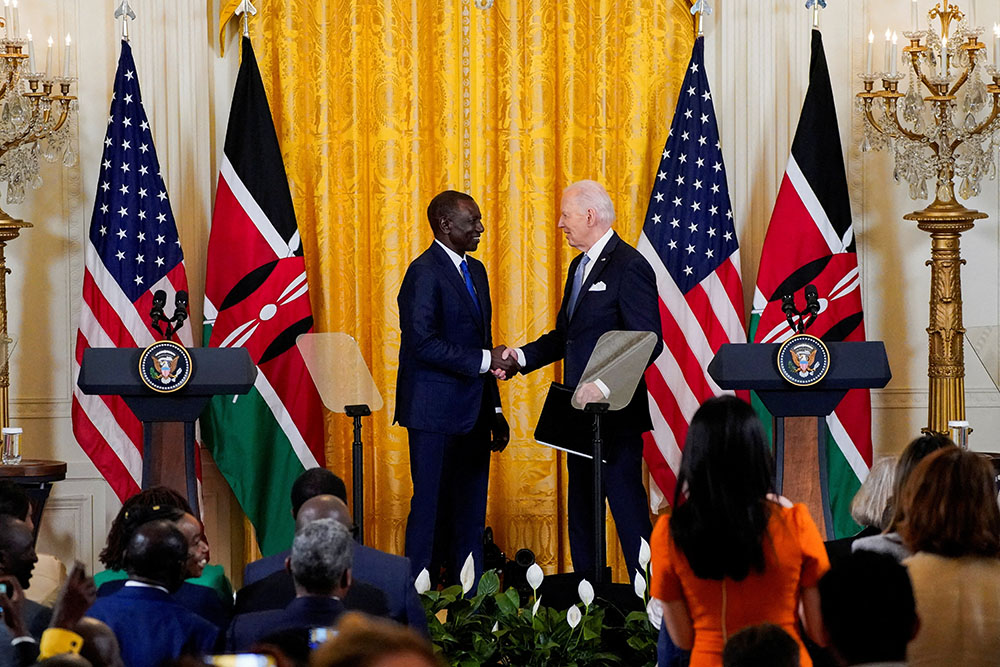(Reuters) – U.S. President Joe Biden welcomed Ken-yan President William Ruto to the White House on Thursday for a state visit, pledging new partnerships on technology, security and debt relief to the leader of one of Afri-ca’s strongest democracies.
Ruto’s is the first state visit by an African president to the White House since 2008, a gesture toward the importance of a continent that is home to 1 billion people and nurtures close trade ties with China, but which ranks behind the wars in Ukraine and Gaza on Washington’s agenda.
On Thursday evening, Ruto was the guest of honor at a lavish state dinner that drew a wide range of guests, from singer-songwriter Don McLean to NFL commissioner Roger Goodell, the CEOs of Walmart WMT.N and Pfizer PFE.N as well as former President Bill Clinton. Former President Barack Obama, whose father was Kenyan, made a brief appearance before the meal.
“We may be divided by distance, but we are united by the same democratic values,” Biden said as he greeted Ruto on the South Lawn of the White House. Biden reminisced about his own visits to Kenya as a young man, hailing 60 years of diplomatic relations between the two countries after Kenya’s independence.
“My visit takes place at a time when democracy is perceived to be retreating worldwide,” Ruto said, standing with Biden, Vice President Kamala Harris and other cabinet officials. Earlier, he had met privately with Biden in the Oval Office.
“We agreed on the significant opportunity for the U.S. to radically recalibrate its strategy and strengthen its support for Africa,” Ruto said. Biden said he would desig-nate Kenya as the first sub-Saharan African country to be a major non-NATO ally. Qatar, Israel and 16 other countries share that designation.
Nairobi and Washington cooperate on fighting terrorism in Africa, stability in Haiti and supporting Ukraine.
The Kenyan president arrived in the United States on Monday and visited Atlanta, then spoke with business executives in the White House on Wednesday. On Friday, he will discuss digital inclusion in Africa with Vice President Kamala Harris at an event hosted by the U.S. Chamber of Commerce.
Successive U.S. governments have said they wanted to offer African countries a more sustainable and democratic alternative to relations with China and Russia, but Washington has failed to establish deep ties.
The continent’s political landscape has been upended in the past year by a spate of military coups, wars and shaky elections that have given China and Russia greater influence. Biden hopes strengthening ties with Kenya, seen as a democratic stronghold, can help stabilize the continent and advance U.S. interests.
In a joint statement, the two leaders said they would work together to support the Somali government in its fight against terrorism and asked warring parties in Sudan to allow humanitarian access to aid and agree to a ceasefire.
The leaders announced new U.S.-backed investments in green energy and health manufacturing, along with a detailed plan to cut Kenya’s high debt load, most of it owed to China.
The U.S. International Development Finance Corporation announced $250 million in new investments in Kenya through the U.S. International Development Finance Corp. That includes $180 million for a major affordable housing project, a U.S. government official said, bringing the U.S. financing institution’s portfolio in Kenya to over $1 billion.
The two leaders made a joint call for the international community to reduce the heavy debt burden of developing countries and do more to support poor countries that want to invest in development and climate technologies.
They also called for the U.S. Congress to pass a bill to renew a U.S.-Africa trade pact.
Haiti’s humanitarian crisis was another focus. Kenya’s plan to deploy 1,000 paramilitary officers to the Caribbean country as part of a U.N.-backed effort to curb gang violence and hunger has been delayed, sources told Reuters.










